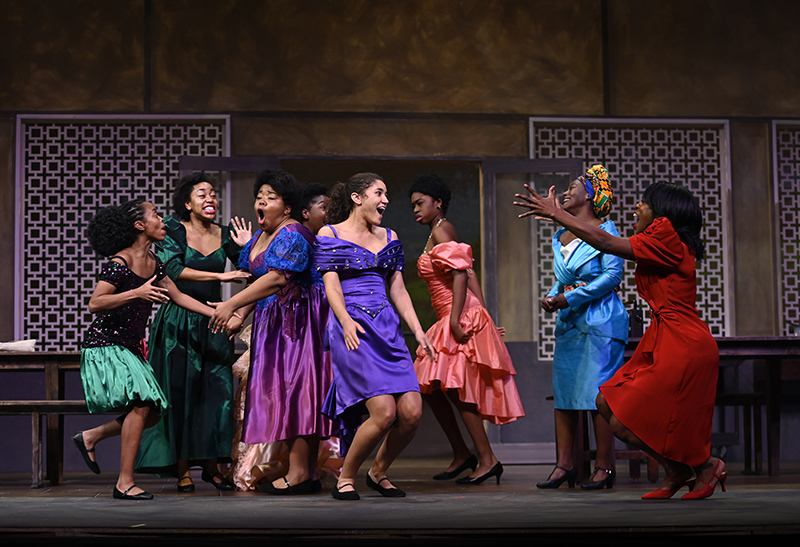During the month of February, I am posting a different post about a black playwright on Facebook everyday. I am compiling the posts here so that the links and resources are easily accessible after the month is over. Happy reading!
February 3
Okay, so I’m starting my first day of posting a different play by a black playwright for the month of February. Today, I have to start with Lorraine Hansberry, the first black woman to have a play produced on Broadway, which was “A Raisin in the Sun” (written in 1957, produced on Broadway in 1959). Though “Raisin” is her best known play, it is certainly not her only. As a matter of fact, she wrote a play called “The Sign in Sidney Brustein’s Window” which is so relevant to today it’s scary. In it, she dissects elections, communism, anti-semitism, and what it truly means to have freedom of thought. I highly recommend reading it.
Link to script here: https://www.southshoreinternational.org/ourpages/auto/2016/5/18/59134211/Lorraine%20Hansberry%20The%20Sign%20in%20Sidney%20Brusteins%20Window.pdf?fbclid=IwAR0DC_YFEoSQqtLtQqaIoRAUj6sgkQqb9XrhdaoFCgfO-ogmb81P1lDaDaA
February 4
The first time I read George C. Wolfe’s play “The Colored Museum” I was about to be in it my junior year of college. This satirical play is comprised of vignettes that poke fun at stereotypical portrayals of black people in theater and film, making farce out of iconic moments in “A Soldier’s Play” and “A Raisin in the Sun.” It’s often done and ever relevant. My favorite scene is the talking wigs. #28DaysofBlackPlays
Script here: https://www.academia.edu/40223858/The_Colored_Museum_by_George_C._Wolfe?fbclid=IwAR21T0iiSGAPLIKnmLoGkv7-TTW7p2iqwhgvW_r9gRbqKOJu7czjdbIe5zU
February 5
Today, I have to salute one of my favorite playwrights, Lynn Nottage. She is the only black woman to win the Pulitzer Prize in Drama twice– first for “Ruined,” which is an arresting drama about the sexual violence women faced during war in the Congo, and “Sweat,” which is about the fate of American factory workers after the 2008 recession. I’ll never forget studying abroad in London and seeing the European premiere of “Ruined” at the Almeida Theatre. I also performed in “Fabulation” my freshman year of college and laughed my way through its absurdities when it was at the Signature Theatre in 2018. Though it’s her dramas that have given her renown, it’s actually one of her early comedies, “Poof!” that made me love her writing. #28DaysofBlackPlays
Here’s the script of “Poof!”: https://www.playscripts.com/play/1062
February 6
Before Tarell Alvin McCraney won the Oscar for “Moonlight” and earned a Tony nomination for “Choir Boy,” he was finding his voice as a regional theatre playwright. In fact, “Moonlight” is based on one of his early plays “In Moonlight Black Boys Look Blue.” I was introduced to his work through his trilogy The Brother/Sister Plays, all of which sit at the intersection of family, community, and poverty. However, it was the way he played with Yoruba mythology, Christianity, voodoo, and Geechee/Gullah traditions that excited me about his work. Any play of his you choose to read will be a treat, but my favorites are “The Brothers Size” and “Choir Boy.” #28DaysofBlackPlays
You can find the script to “Choir Boy” here: https://kupdf.net/download/choir-boy-script_5af79ff9e2b6f58631116991_pdf?fbclid=IwAR2qXbruc8A80fSYVxWGh14evMEMcFqwpSgkae4yHxrNHnI29ADLXExs2D0
February 7
It’s been a wild morning, so I’m a bit late posting, but it’s worth it to shoutout Suzan-Lori Parks. She was the first African American woman to ever win the Pulitzer Prize in Drama for her play “Topdog/Underdog” (2002). What I like about Parks’ work is that she is Brechtian in her inclination toward the absurd. She plays with form, dialogue, and utilizes mythical characters to examine race and gender. Her plays “Venus” (play on Sarah Baartman/Hottenot Venus), “Fucking A,” (The Scarlet Letter), and “Father Comes Home From The Wars (Parts 1, 2 & 3)” (play on The Odyssey) in particular have been quite controversial. Below I’ve included a link to the script to one of her earlier plays, “The America Play,” which finds a black family in an abandoned Americana themed amusement park. #28DaysofBlackPlays
Script to “The America Play” here: http://professormalone.com/images/The-America-Play-2.pdf
February 8
Katori Hall made a splash in the American theater with her play “The Mountaintop,” which reimagines the last evening of Martin Luther King, Jr.’s life in the Lorraine Motel in Memphis. Here, he encounters a hotel maid and in addition to the hero we know, Hall portrays King as an ordinary man with all the temptations that one faces including coffee, cigarettes and sex. I saw the Broadway production starring Angela Bassett and Samuel L. Jackson in 2012 (but I have to say that Cynthia D. Barker is the best Cara Mae I’ve seen in a few different productions of this show). Since then, Hall has also found success in the regional and college theater scene. Plus, she wrote the libretto for the Tina Turner musical currently running on Broadway. #28DaysofBlackPlays
Here’s an interview I did with Hall about penning TINA: https://www.tdf.org/stages/article/2276/if-you-think-you-know-tina-turners-story-youre-wrong
February 9
Dominique Morisseau has been one of the most produced playwrights in America for the last five years. She calls herself the scribe of Detroit. Her trilogy takes the audience throughout the thriving Black Bottom neighborhood in the 1940s, then to the 1967 riots, and finally to the auto industry crisis in 2008. My favorite play of her’s is “Pipeline” about a middle class boy with two educated parents who still finds himself entangled in the school-to-prison pipeline because of a school’s rigid zero tolerance policy. She also wrote the book for The Temptations musical “Ain’t Too Proud.” #28DaysofBlackPlays
Here’s an interview I did with Morisseau in 2015 which covers a lot of her work: https://www.artsatl.org/preview-playwright-dominique-morisseau-detroit-67
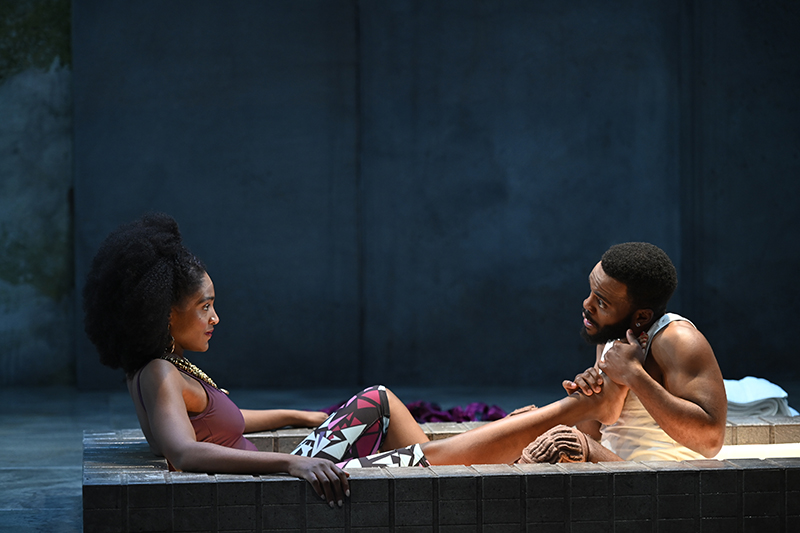
February 10
Today, I have to salute Donja R. Love, who I had the pleasure of introducing at the American Theatre Critics Association New York luncheon at Sardi’s in 2018. His Love Trilogy examines queer love during significant moments in black American history. He is a champion of deconstructing false notions of what makes a man masculine as well as establishing a presence for black queer people both in history and in the theater. As an aside, I would really like for a theater in Atlanta to do his play “Fireflies.” (Talking to you Horizon, Actor’s Express, or 7 Stages) #28DaysofBlackPlays
February 11
August Wilson is arguably the most accomplished American playwright in our nation’s history. He wrote 10 plays, one about the African American experience for every decade of the 20th century. All 10 plays were produced on Broadway and he won the Pulitzer Prize for both “The Piano Lesson” and “Fences.” The latter was adapted into an Oscar Award winning film in 2016. My favorite of his plays is the 1940s play, “Seven Guitars,” which is also the most rarely produced of the cycle. In it, a blues musician tries to recover from his past and his womanizing ways after being released from prison. Wilson’s plays are very male-centric, but my favorite of his female characters, Ruby, appears in this one. #28DaysofBlackPlays
Here is the screenplay of “Fences”: http://scriptfest.com/…/wp-conte…/uploads/2017/01/FENCES.pdf
February 12
I interviewed one of my favorite artists, Mickalene Thomas, a couple of months ago, and in our conversation she said, “It is just as daring to depict black luxury as it is black squalor.” Lydia R. Diamond does the former very well. The black people in her plays summer on Martha’s Vineyard (“Stick Fly,” produced on Broadway in 2012), are Ivy League educated (“Stage Black” is Black Twitter before Black Twitter), and still have a consciousness about classism in their communities (“Smart People” has some of the best monologues). I call her style “Fresh Prince of Bel-Air” theater, because she infuses humor, scandal, and wit into her scripts so well. Hers is truly a modern day comedy of manners, which is one of my favorite genres of theater. #28DaysofBlackPlays
Here is the original Broadway study guide, which features a note from Alicia Keys, who composed the music: http://www.theleagueonline.org/downl…/20110124-stick-fly.pdf
February 13
Janine Nabers first got on my radar about five years ago when her play “Serial Blackface” was winning all the theater prizes. It is about the Atlanta child murders and the impact a missing child has on a family. In general, Nabers’ plays explore what happens when someone goes missing, both literally and figuratively. This is no doubt inspired by her memories of Hurricane Katrina (she’s from Houston). She is currently a writer on HBO’s “Watchmen,” which just won the Writers Guild of America Award for Best New Series. #28DaysofBlackPlays
Here is 2016 interview I did with her: https://www.artsatl.org/preview-playwright-janine-nabers-history-atlantas-child-murders-serial-black-face
February 14
Jocelyn Bioh was an actress before becoming a theater “it girl” in 2017 when her play “School Girls; or the African Mean Girls Play” dazzled audiences at MCC Theatre in New York. The play is set at an all girls school in Ghana where a mean girls clique is vying to impress a recruiter for the Miss Ghana pageant. Then, a light-skinned girl transfers to school and all of their plans are turned upside down. I am going to see the regional premiere of this show at True Colors Theatre in Atlanta tonight. I also can’t wait to see her new play, “Nollywood Dreams,” about a woman who aspires to create the first Nigerian film to cross-over to the western world. #28DaysofBlackPlays
Here’s a preview I wrote about the Atlanta production of “School Girls”: https://www.atlantamagazine.com/news-culture-articles/true-colors-production-of-school-girls-sparks-conversation-about-colorism-and-pretty-privilege
February 15
I met Josh Wilder at the National Critics Institute in 2015. At the time, he was workshopping a modern “Jack and the Beanstalk” adaptation called “Leftovers.” It’s set in a post-Cosby scandal Philadelphia where black boys are climbing up a magical plant in hopes of finding a better life. I remember liking the concept and hoping to see more from him in the future. The displacement of black youth is a through line in his work and I think we can always use more stories that acknowledge and affirm the lives of black children. Currently, he’s stationed in Atlanta as a ‘19-’21 Playwriting Fellow at Emory University. #28DaysofBlackPlays
February 16
Branden Jacobs-Jenkins has been rattling theater audiences for the last five years and I’m certain he’s not done. His play “An Octoroon” satirizes the absurdity of racism by re-creating a plantation era minstrel show. In “Appropriate” a white family must reckon with their late patriarch’s past as a bone collecting klansman. His latest play “Gloria” is about an aspiring journalist who will stop at nothing to land a front page story. Jacobs-Jenkins has a knack for getting inside of the minds of people who are running from the truth. #28DaysofBlackPlays
Here’a a video of him talking about his first play “Neighbors”: https://www.theparisreview.org/blog/2015/05/28/branden-jacob-jenkins-on-his-play-neighbors
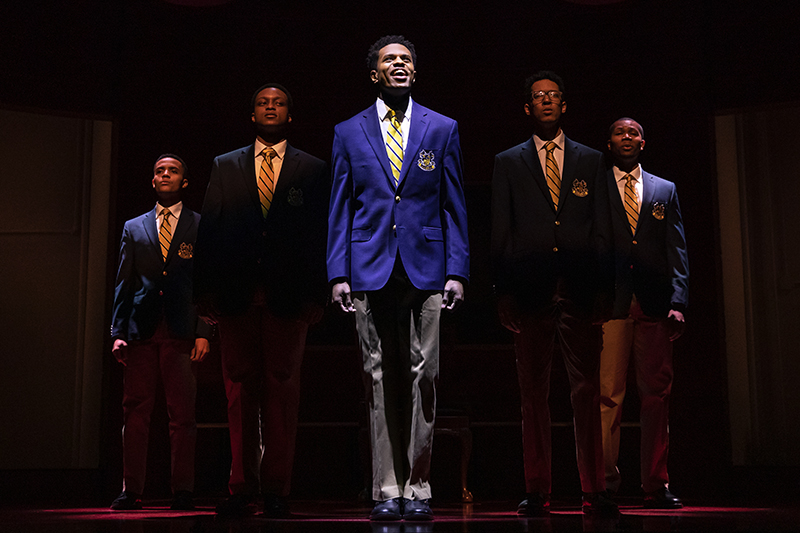
February 17
Ike Holter is one of the most remarkable playwrights to come out of Chicago in a long time. His seven play series explores black life in Chicago, much like August Wilson did for Pittsburgh. “Exit Strategy” is perhaps his most well-known play and shows us a week in the life of the students and teachers at an inner city school, which is about to be closed due to increased violence and decreased resources in the community. I like Holter’s work because it reminds me of one of my favorite playwrights, Stephen Adly Guirgis, who wrote “The Get Down” on Netflix. His style is zany, gritty, colorful, and his characters live in a diverse world. Other popular plays by Holter include “Hit the Wall,” “Wolf at the End of the Block,” and “Lottery Day.” #28DaysofBlackPlays
February 18
I see a lot of art, especially theater, over the course of the year and honestly a lot of it starts to go through you instead of sticking with you. However, this was not the case for Kimberly Monks’ play “Hands Of Color.” In it, a white man and the black man he called the police on switch bodies and lives. It’s “Freaky Friday” and “A Christmas Carol” in a post-Black Lives Matter America. In addition to playwriting, she is an actress and former company member at Oregon Shakespeare Festival. #28DaysofBlackPlays
Here is an interview ARTS ATL published with her last year: https://www.artsatl.org/qa-kimberly-monks-wants-her-new-drama-hands-of-color-to-haunt-audiences
February 19
I met Nambi E. Kelley after she served as a panelist for the American Theatre Critics Conference in Manhattan. I was impressed by her grace, exuberant energy and fantastic shoes. She has penned plays for Steppenwolf, Goodman Theatre, and Court Theatre/American Blues Theater in Chicago as well as Lincoln Center and the National Black Theatre in New York. Kelley adapted Richard Wright’s seminal work, Native Son, for the stage to much acclaim and she is working on a stage adaptation of Toni Morrison’s Jazz. Look out for Phenomenal Woman: Maya Angelou, starting its rolling world premiere at North Carolina Black Repertory Company in May. #28DaysofBlackPlays
February 20
Most people know Danai Gurira from her roles in “The Walking Dead” and “Black Panther,” however she is also a formidable playwright. Her plays include “Familiar,” “In the Continuum,” “The Convert,” and “Eclipsed.” “Eclipsed,” which is a glimpse into the lives of women who survived rape in the Second Liberian Civil War, was the first show on Broadway to have an all-female cast, creative team, and crew in 2016. #28DaysofBlackPlays
Here is an article I wrote for Milwaukee Rep previewing their production of “Eclipsed”: https://www.milwaukeerep.com/news/articles/Eclipsed-gives-voice-to-the-voiceless/
February 21
When most people think of Zora Neale Hurston, they think of her novel “Their Eyes Were Watching God,” however, Ms. Hurston wrote 10 plays throughout her esteemed literary career. Some people may know of the quirky and funny musical “Spunk,” which follows everyday folk through their everyday passions, but she also wrote other scripts rooted in African American folklore during the 1920s, 30s and 40s. #28DaysofBlackPlays
All of Hurston’s plays are in the Library of Congress. You can read them here: https://www.loc.gov/collections/zora-neale-hurston-plays/about-this-collection
February 22
When I was first introduced to the work of Amiri Baraka (who also wrote under the names LeRoi Jones and Imamu Amear Baraka) it was through his writings as a poet and activist. He was involved with the Black Panther Party and was one of the only artists in the room for the formation of the Congressional Black Caucus. However, Baraka saw theater, not politics, as a powerful venue to advance positive social change. “Dutchman” is his best known play and examines race relations during the rise of the Black Nationalist Movement and the Nation of Islam. A year before he died in 2014, he published “The Most Dangerous Man in America (WEB DuBois),” a biographical play about the famous black scholar. #28DaysofBlackPlays
February 23
Anna Deveare Smith is an actress and playwright who creates documentary theater about conflict. In her one-person shows, she humanizes people on opposing ends of a social ill in order to spread empathy. She goes into communities and talks to real people and then brings their voices to the stage, similar to a documentary filmmaker. Her first play “Fires in the Mirror” featured interviews with Jewish and Haitian residents in Crown Heights, Brooklyn after a Haitian boy was killed by a Jewish man in a hit-and-run. The incident led to riots and the killing of a young man named Yankel Rosenbaum. She’s also known for her play “Twilight: Los Angeles 1992” which is about the aftermath of the verdict in the Rodney King case. #28DaysofBlackPlays
You can watch all four parts of the PBS adaptation of “Fires in the Mirror” here: https://www.youtube.com/watch?v=hnkrUJny0CE
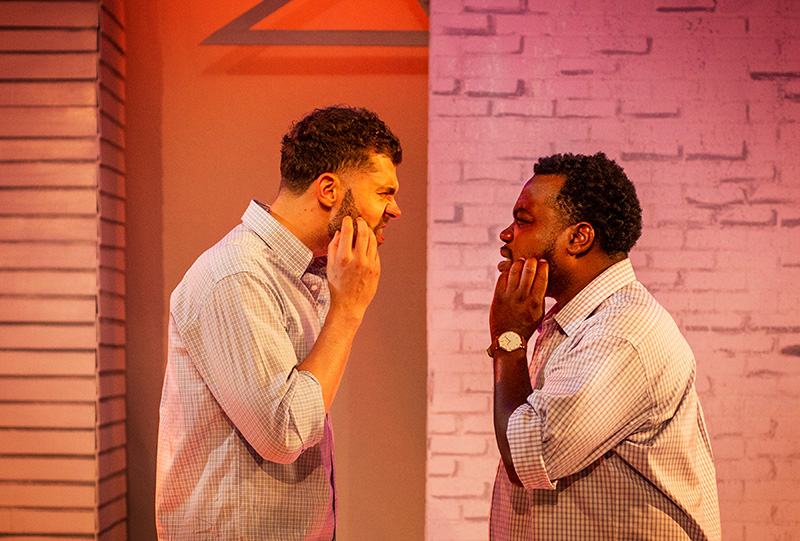
February 24
For the next couple of days, I’ll be showing some Atlanta-based playwrights love. I’ll start with Gabrielle Fulton Ponder, whose work is largely inspired by forgotten historical events in the deep south. She has written plays about everything from the first black biennial at the Atlanta University Center to a slave uprising in Virginia. Her plays include “Uprising,” “Sweet Dill,” “Redemption’s Road,” “MILF,” “The Seed Planter,” “Jill Fell Down,” “Death of Lightning Bugs,” and “Carrying the Mother Load.” She is currently a staff writer on the OWN television show “Ambitions.” #28DaysofBlackPlays
February 25
When I saw Avery Sharpe’s play “Woke” in 2018, I immediately thought that it was the type of play that every high school and college theater program needs to tackle. It follows two boys, one black and the other white, through their senior year of high school and freshman year of college. They have been friends since childhood, but that close bond is splintered by a difference of perspective on police violence against black men following the killings of Philando Castile and Alton Sterling. (He writes one of the best most awkward dinner scenes ever.) I love theater, but rarely see plays that speak to my own experiences. This one did, and I think it speaks to many young people who have lost friends because they didn’t believe them when they said racism was real. In addition to “Woke,” Sharpe also writes YA plays and is working on a script about child separation at the southern border. #28DaysofBlackPlays
February 26
Before Lin-Manuel Miranda brought hip hop to Broadway in “Hamilton,” playwright Will Power was remixing classical text to hip hop beats. His plays combine iambic pentameter and the rhythmic tradition of 16 bars to connect the social conflicts of old to the present. His play “Seize the King” takes on “Richard III” and his play “The Seven” is an adaptation of “Oedipus Rex.” In addition to classical texts, he also takes inspiration from black history, which is the case of “Fetch Clay, Make Man,” about an unlikely connection between Stepin Fetchit and Muhammed Ali. In addition to writing plays, Power is a theater professor at Spelman College. #28DaysofBlackPlays
February 27
I couldn’t continue my week of highlighting Atlanta-based playwrights without putting a spotlight on Pearl Cleage. She has been writing for 40 years and her book “What Looks Like Crazy on an Ordinary Day” was an Oprah’s Book Club official selection. She is currently the Alliance Theatre’s resident playwright where they have produced her plays “Blues for an Alabama Sky,” “Tell Me My Dream,” “What I Learned in Paris,” “Pointing at the Moon,” and “Hospice.” Her plays often place fictional characters in the mix with real life people or in the context of little known historical moments. #28DaysofBlackPlays
I recently interviewed Cleage and actresses who have played some of her iconic characters for The New York Times: https://www.nytimes.com/2020/01/23/theater/blues-for-an-alabama-sky
February 28
The first time I read Kia Corthron’s play “Breath, Boom” I was impressed with her mastery of dialogue. Her plays are often inspired by the most difficult social ills: juvenile delinquency, racism, religious persecution– and she creates distinct characters who voice those concerns so well. She has traveled to the Gaza Strip and to Liberia to write plays about colonization. Her play “Force Continuum,” is about “an African-American police officer who struggles with the contradictions of his race and profession while confronting the black community he is bound to protect and being haunted by his cop father’s violent death.” These days she’s focused on writing novels. Her 2016 book “The Castle Cross the Magnet Carter” was a New York Times Critics Pick. #28DaysofBlackPlays
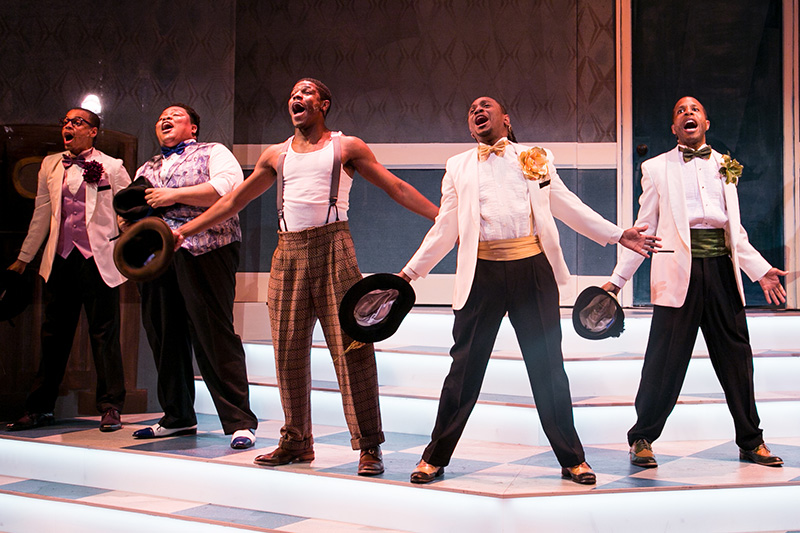
February 29
Actor, playwright, director, and producer are all words that describe Colman Domingo. I read his play “Wild With Happy” about six years ago and loved his talent for adding humor into serious situations. In “Wild With Happy,” a man reconciles his relationship with his mother on a road trip to take her ashes to Disney World. His play “DOT” is about a group of dysfunctional siblings who have to decide what to do with their mother who has been hiding her Alzheimers diagnosis. He just penned a deal with Showtime, so I look forward to seeing what he does next. #28DaysofBlackPlays
March 1
Christina Ham’s plays, though mostly fiction, cement women’s place in history. Her play “Back Bay” is about a female true crime detective; “Glyph” is about a former slave who confronts her former master on his death bed; and “After Adam” is a take on the Oedipus myth about how an African American family copes after their patriarch commits suicide. Her most popular play, “Nina Simone: Four Women,” gives voice and body to the four women Ham imagines inspired Simone’s song of the same title. Her new play, “Ruby: The Story of Ruby Bridges” is onstage at Alabama Shakespeare Company in Montgomery March 6-March 22. #28DaysofBlackPlays
March 2
(I started these on Feb. 3 so I’m still going) I was introduced to Darren Canady in 2014 when Horizon Theatre produced his play “Right On!” which is about the generational divide between the social movements of the 60s and today. I was struck by his willingness to allow his characters to be wrong and righteous onstage. Canady doesn’t write characters for you to fall in love with, but he does write characters that remind you of people you know. His play “Ontario Was Here” is about two social workers who cross ethical boundaries to the detriment of themselves and a child. His latest play, “Reparations,” which I desperately want to see, is about a new technology that “sends people of color back into their ancestors’ lives, documenting injustices and atrocities, then using algorithms to determine the appropriate payout.” I also highly recommend reading his plays “Brothers of the Dust,” “False Creeds,” and “Muddy the Water.” He is a Topeka native and is a professor at the University of Kansas. #28DaysofBlackPlays
March 3
Today, I want to dedicate my status to all of the stage play writers out there. For those unfamiliar with stageplays, they are Broadway-like productions that usually tour through cities with a significant black population. They are a holdover from the days of Black Vaudeville and typically have the feeling of a live soap opera. Because black people were kept out of the commercial theater for so long, they created their own way to tell stories about family, religion, love, and hope. This is how Tyler Perry got his start as an actor/director/producer. Some other popular stageplay writers are Lolita Snipes, Je’Caryous Johnson, David E. Talbert, Trey Anthony (“Da Kink in My Hair”), and there are countless others.
This is the last day of #28DaysofBlackPlays. Thank you to everyone who engaged and learned something. I have compiled all of the posts into a single post on my blog, which I will share once I finish adding images. Celebrating blackness is not the antithesis of anyone. It is an affirmation of everyone.
